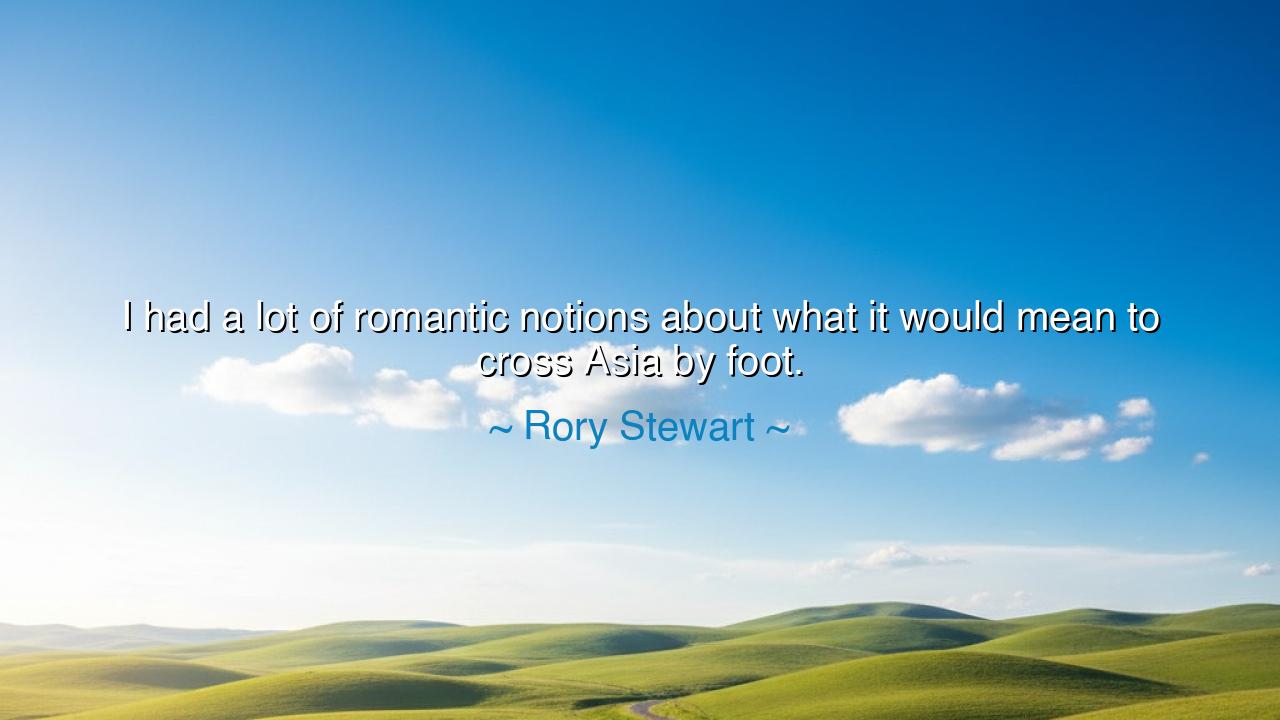
I had a lot of romantic notions about what it would mean to cross






Hear the words of Rory Stewart, traveler and seeker of truth, who confessed: “I had a lot of romantic notions about what it would mean to cross Asia by foot.” In this statement lies the eternal tension between dream and reality, between the poetry of the imagination and the harshness of the road. Stewart, who set out on long journeys through lands scarred by war and blessed with beauty, speaks here as one who once dreamed in colors too bright, and who then learned what it means to live within the dust, the cold, and the burden of miles walked one step at a time.
The romantic notion of travel is as old as humanity itself. The ancients imagined the wanderer as hero—Odysseus sailing home from Troy, Marco Polo crossing deserts toward the riches of the East, pilgrims trudging toward holy shrines beneath the gaze of God. To walk across Asia, in the mind of the dreamer, is to touch civilizations, to taste the vastness of earth, to meet humanity in its thousand forms, to feel the wind of history upon one’s face. This is the romance of the road, painted in poetry and song.
Yet reality is sterner. To cross Asia by foot is not only to behold beauty, but also to endure exhaustion, hunger, solitude, suspicion, and danger. Stewart’s journeys through Afghanistan and beyond revealed this truth. The dream of wandering beneath starlit skies gave way to the weight of blistered feet, freezing nights, and encounters with distrustful villagers or armed men. Where imagination spoke of freedom, reality demanded endurance. Where romance pictured endless horizons, reality offered mud, fatigue, and fear. Thus the romantic notions of the mind were tested, and in that testing, they were remade.
History offers countless echoes of this pattern. Consider the journey of Alexander the Great, who dreamed of conquering the known world. His vision was clothed in romance—of spreading civilization, of joining East and West—but the reality was death marches through deserts, mutinous soldiers, and his own untimely death. Or think of the explorers of the Silk Road, who envisioned riches and discovery, but who often found themselves ravaged by storms, bandits, or disease. In each case, the romance of the journey clashed with the brutality of the earth itself.
And yet, the failure of the romantic ideal does not mean it was worthless. For Stewart admits that the notions of romance gave him courage to begin, even if they could not sustain him through the whole. Dreams often serve this purpose: they are the spark that sets us upon the path. Without the dream, no step is taken; without the hope of wonder, no endurance is summoned. Romance deceives, but it also inspires. It is the flame that leads us into the storm, where reality forges us into something truer and stronger.
The meaning of Stewart’s words, then, is that one must walk both with dreams and with truth. The romantic notion is not to be despised, for it brings us to the road. But neither must it be clung to, for reality demands more of us: resilience, humility, and perseverance. The true traveler, the true seeker, is one who begins in romance but learns endurance, who dreams of beauty yet accepts hardship, who holds wonder even as he trudges through pain.
Therefore, children of tomorrow, take this lesson: cherish your romantic notions, but be ready for them to be broken. Do not fear this breaking, for it will lead you to a deeper strength. Begin with dreams, but continue with discipline. Walk your journey not only for the glory imagined, but for the truth encountered. And in the end, you will discover that the true romance of life is not in the visions you carried at the beginning, but in the wisdom you bear at the end.
Thus Rory Stewart’s words become a timeless counsel: the path across Asia—or across any trial of life—begins in romance, but is fulfilled in endurance. And in that union of dream and struggle, we find the story of humanity itself.






AAdministratorAdministrator
Welcome, honored guests. Please leave a comment, we will respond soon